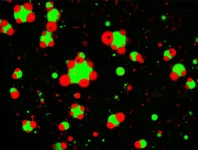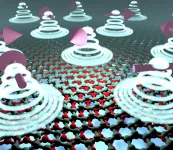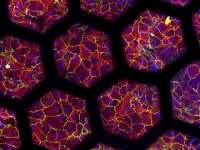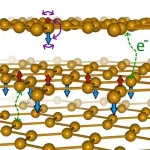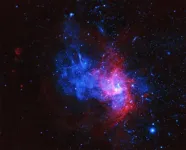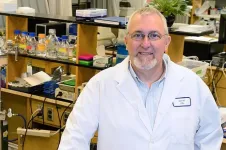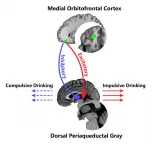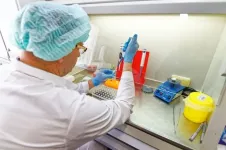INFORMATION:
In addition to Banerjee, Potoyan and Kaur, co-authors of the study included Iowa State University chemistry postdoctoral researcher Muralikrishna Raju; UB physics PhD student Ibraheem Alshareedah; and UB physics postdoctoral researcher Richoo Davis.
The study was supported by the National Institute of General Medical Sciences, part of the U.S. National Institutes of Health, and the U.S. National Science Foundation (NSF). The team also received assistance from two NSF-funded resources: The UB North Campus Confocal Imaging Facility, and the Extreme Science and Engineering Discovery Environment.
What rules govern the structure of membraneless organelles?
A study in Nature Communications outlines physical rules regulating the architecture of these liquid organelles
2021-02-08
(Press-News.org) BUFFALO, N.Y. -- In cells, numerous important biochemical functions take place within spherical chambers made from proteins and RNA.
These compartments are akin to specialized rooms inside a house, but their architecture is radically different: They don't have walls. Instead, they take the form of liquid droplets that don't have a membrane, forming spontaneously, similar to oil droplets in water. Sometimes, the droplets are found alone. Other times, one droplet can be found nested inside of another. And these varying assemblies can regulate the functions the droplets perform.
A study published on Feb. 8 in Nature Communications explores how these compartments, also known as membraneless organelles (MLOs) or biomolecular condensates, form and organize themselves. The research lays out physical rules controlling the arrangement of various types of synthetic MLOs created using just three kinds of building materials: RNA and two different proteins, a prion-like polypeptide (PLP) and an arginine-rich polypeptide (RRP).
The project brought together a team from the University at Buffalo and Iowa State University.
"Different condensates can coexist inside the cells," says first author Taranpreet Kaur, a PhD student in physics in the UB College of Arts and Sciences. "They can be detached, attached to another condensate, or completely embedded within one another. So how is the cell controlling this? We found two different mechanisms that allowed us to control the architecture of synthetic membraneless organelles formed inside a test tube. First, the amount of RNA in the mixture helps to regulate the morphology of the organelles. The other factor is the amino acid sequence of the proteins involved."
"These two factors impact how sticky the surfaces of the condensates are, changing how they interact with other droplets," says Priya Banerjee, PhD, UB assistant professor of physics, and one of two senior authors of the paper. "In all, we have shown using a simple system of three components that we can create different kinds of organelles and control their arrangement in a predictive manner. We suspect that such mechanisms may be employed by cells to arrange different MLOs for optimizing their functional output."
Davit Potoyan, PhD, assistant professor of chemistry at Iowa State University, is the study's other senior author.
Addressing questions in cell biology
The experiments were done on model systems made from RNA and proteins floating in a buffer solution. But the next step in the research -- already underway -- is to conduct similar studies inside a living cell.
"Going back to our motivations in researching MLOs, the big questions that started the field were questions in cell biology: How do cells organize their internal space?" Banerjee says. "The principles we uncover here contribute to the knowledge base that will improve understanding in this area."
Research on MLOs could lead to advancements in fields such as synthetic cell research or new materials for drug delivery.
"We are in the process of learning the biomolecular grammar that may be a universal language used by cells for taming their inner cellular complexity. We hope one day to utilize this knowledge to engineer artificial protocells with custom-designed functionalities inspired by nature," Potoyan says.
ELSE PRESS RELEASES FROM THIS DATE:
Some types of coronavirus steal the hosts' genes to elude their immune system
2021-02-08
Some coronaviruses can add to their genetic pool some genes belonging to the host they infected. In this way, they can blend in and be less detectable to the immune system. This discovery was published in the journal Viruses by an Italian research team from the IIS (Italian Healthcare Institute), ISPRA (Institute for Environmental Protection and Research), IZSLER (Italian health authority and research organization for animal health and food safety of Lombardy and Emilia-Romagna) and the University of Bologna.
The outcome of this study demonstrates that coronaviruses encompass a sophisticated evolutionary mechanism ...
A magnetic twist to graphene
2021-02-08
Electrons in materials have a property known as 'spin', which is responsible for a variety of properties, the most well-known of which is magnetism. Permanent magnets, like the ones used for refrigerator doors, have all the spins in their electrons aligned in the same direction. Scientists refer to this behaviour as ferromagnetism, and the research field of trying to manipulate spin as spintronics.
Down in the quantum world, spins can arrange in more exotic ways, giving rise to frustrated states and entangled magnets. Interestingly, a property similar to spin, known as "the valley," appears in graphene materials. This unique feature has given rise to the field of valleytronics, which aims to exploit the ...
Bernese researchers create sophisticated lung-on-chip
2021-02-08
The lung is a complex organ whose main function is to exchange gases. It is the largest organ in the human body and plays a key role in the oxygenation of all the organs. Due to its structure, cellular composition and dynamic microenvironment, is difficult to mimic in vitro.
A specialized laboratory of the ARTORG Center for Biomedical Engineering Research, University of Bern, headed by Olivier Guenat has developed a new generation of in-vitro models called organs-on-chip for over 10 years, focusing on modeling the lung and its diseases. After a first successful lung-on-chip system exhibiting essential features of the lung, the Organs-on-Chip (OOC) Technologies laboratory has now developed a purely ...
'Magnetic graphene' forms a new kind of magnetism
2021-02-08
Researchers have identified a new form of magnetism in so-called magnetic graphene, which could point the way toward understanding superconductivity in this unusual type of material.
The researchers, led by the University of Cambridge, were able to control the conductivity and magnetism of iron thiophosphate (FePS3), a two-dimensional material which undergoes a transition from an insulator to a metal when compressed. This class of magnetic materials offers new routes to understanding the physics of new magnetic states and superconductivity.
Using new high-pressure techniques, the researchers have shown what happens to magnetic graphene during the transition from insulator to conductor and into ...
Popular tool for measuring child feeding practices validated by RIT researcher
2021-02-08
A Rochester Institute of Technology researcher has validated a tool measuring adherence to a popular child feeding approach used by pediatricians, nutritionists, social workers and child psychologists to assess parents' feeding practices and prevent feeding problems.
The best-practice approach, known as the Satter Division of Responsibility in Feeding, has now been rigorously tested and peer reviewed, resulting in the quantifiable tool sDOR.2-6y. The questionnaire will become a standard parent survey for professionals and researchers working in the early childhood development field, predicts lead researcher ...
Rare blast's remains discovered in Milky Way's center
2021-02-08
Astronomers may have found our galaxy's first example of an unusual kind of stellar explosion. This discovery, made with NASA's Chandra X-ray Observatory, adds to the understanding of how some stars shatter and seed the universe with elements critical for life on Earth.
This intriguing object, located near the center of the Milky Way, is a supernova remnant called Sagittarius A East, or Sgr A East for short. Based on Chandra data, astronomers previously classified the object as the remains of a massive star that exploded as a supernova, one of many kinds of exploded stars that scientists have catalogued.
Using longer Chandra observations, a team of astronomers has now instead concluded that the object is left over from a different type of ...
Brain protein that causes Alzheimer's also protects against the disease: USask research
2021-02-08
Findings from a new study on Alzheimer's disease (AD), led by researchers at the University of Saskatchewan (USask), could eventually help clinicians identify people at highest risk for developing the irreversible, progressive brain disorder and pave the way for treatments that slow or prevent its onset.
The research, published in the journal Scientific Reports in early January, has demonstrated that a shorter form of the protein peptide believed responsible for causing AD (beta-amyloid 42, or Aβ42) halts the damage-causing mechanism of ...
Neural roots/origins of alcoholism identified by British and Chinese researchers
2021-02-08
A pathway in the brain where alcohol addiction first develops has been identified by a team of British and Chinese researchers in a new study
Could lead to more effective interventions when tackling compulsive and impulsive drinking
More than 3 million deaths every year are related to alcohol use globally, according to the World Health Organisation
The physical origin of alcohol addiction has been located in a network of the human brain that regulates our response to danger, according to a team of British and Chinese researchers, co-led by the University of Warwick, the University ...
New timeline of deadliest California wildfire could guide lifesaving research and action
2021-02-08
On a brisk November morning in 2018, a fire sparked in a remote stretch of canyon in Butte County, California, a region nestled against the western slopes of the Sierra Nevada mountains. Fueled by a sea of tinder created by drought, and propelled by powerful gusts, the flames grew and traveled rapidly. In less than 24 hours, the fire had swept through the town of Paradise and other communities, leaving a charred ruin in its wake.
The Camp Fire was the costliest disaster worldwide in 2018 and, having caused 85 deaths and destroyed more than 18,000 buildings, it became both the deadliest and most destructive wildfire ...
Ophiura from Russky Island might make photodynamic therapy more affordable
2021-02-08
An unusual biologically active porphyrin compound was isolated from seabed dweller Ophiura sarsii. The substance might be used as an affordable light-sensitive drug for innovative photodynamic therapy and for targeted treatment of triple-negative breast cancer and some other cancers. Researchers from the School of Biomedicine of Far Eastern Federal University (FEFU) and the University of Geneva reported the findings in Marine Drugs.
The seabed dweller Ophiura sarsii, the source of the new compound, was isolated at a depth of 15-18 meters in Bogdanovich Bay, Russky Island (Vladivostok, Russia). Ophiuras may resemble ...
LAST 30 PRESS RELEASES:
Scientists identify smooth regional trends in fruit fly survival strategies
Antipathy toward snakes? Your parents likely talked you into that at an early age
Sylvester Cancer Tip Sheet for Feb. 2026
Online exposure to medical misinformation concentrated among older adults
Telehealth improves access to genetic services for adult survivors of childhood cancers
Outdated mortality benchmarks risk missing early signs of famine and delay recognizing mass starvation
Newly discovered bacterium converts carbon dioxide into chemicals using electricity
Flipping and reversing mini-proteins could improve disease treatment
Scientists reveal major hidden source of atmospheric nitrogen pollution in fragile lake basin
Biochar emerges as a powerful tool for soil carbon neutrality and climate mitigation
Tiny cell messengers show big promise for safer protein and gene delivery
AMS releases statement regarding the decision to rescind EPA’s 2009 Endangerment Finding
Parents’ alcohol and drug use influences their children’s consumption, research shows
Modular assembly of chiral nitrogen-bridged rings achieved by palladium-catalyzed diastereoselective and enantioselective cascade cyclization reactions
Promoting civic engagement
AMS Science Preview: Hurricane slowdown, school snow days
Deforestation in the Amazon raises the surface temperature by 3 °C during the dry season
Model more accurately maps the impact of frost on corn crops
How did humans develop sharp vision? Lab-grown retinas show likely answer
Sour grapes? Taste, experience of sour foods depends on individual consumer
At AAAS, professor Krystal Tsosie argues the future of science must be Indigenous-led
From the lab to the living room: Decoding Parkinson’s patients movements in the real world
Research advances in porous materials, as highlighted in the 2025 Nobel Prize in Chemistry
Sally C. Morton, executive vice president of ASU Knowledge Enterprise, presents a bold and practical framework for moving research from discovery to real-world impact
Biochemical parameters in patients with diabetic nephropathy versus individuals with diabetes alone, non-diabetic nephropathy, and healthy controls
Muscular strength and mortality in women ages 63 to 99
Adolescent and young adult requests for medication abortion through online telemedicine
Researchers want a better whiff of plant-based proteins
Pioneering a new generation of lithium battery cathode materials
A Pitt-Johnstown professor found syntax in the warbling duets of wild parrots
[Press-News.org] What rules govern the structure of membraneless organelles?A study in Nature Communications outlines physical rules regulating the architecture of these liquid organelles
